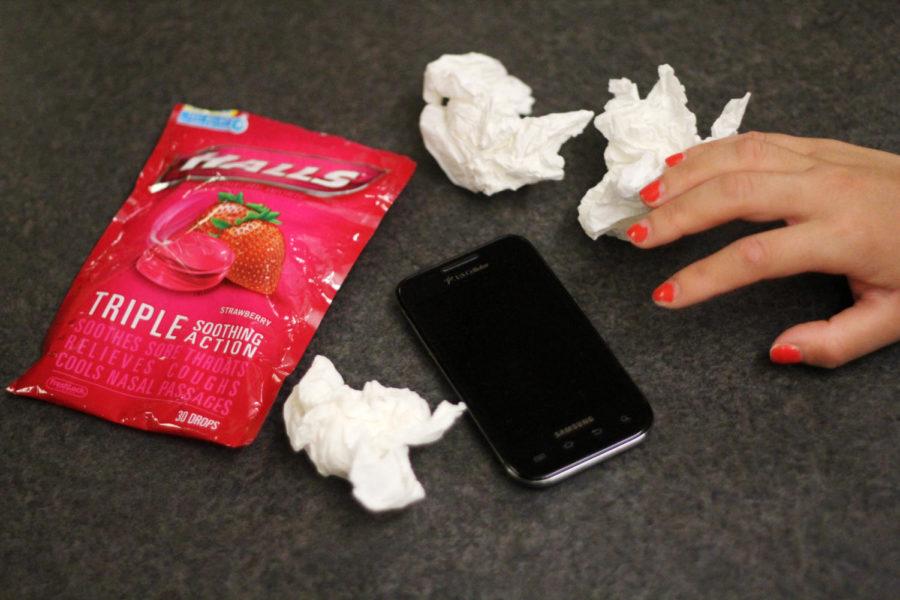Can cellphones spread sickness? Steps to take to avoid spreading germs
Photo illustration: William Deaton/Iowa State Daily
It’s cold and influenza season, and germs are known to cling to surface objects, cellphones being a prime target. People don’t realize that being sick and using someone elses phone can spread germs to many.
November 26, 2012
During the cold and flu season, students are regularly told the usual precautions: Cough and sneeze into your elbow; wash your hands; and think about how dirty that door knob and other common surfaces might be. But could cellphones be a new carrier of sickness too?
“Common illnesses we can see spreading from hands, phones and common surfaces are: pinkeye, colds, influenza, … [with symptoms of] nausea, vomiting and diarrhea that commonly go around,” said Laura Knowles, supervisor for nursing and patient services at the Thielen Student Health Center. “These are the unintended consequences of new technology, so we don’t know all of the risks yet.”
Nancy Boury, senior lecturer in microbiology, said microbes do not change throughout the day, but if students have a virus or bacteria someone else does not have, that is where cellphones could play a role.
“It is theoretically possible, but how often do people trade their cell hones back and forth?” Boury said. “Organisms that usually live on your skin will be roughly the same when you pick up [your] phone [for] the first time of the day as the last time you pick up your phone for the day. … If you have a cold or the flu, don’t go lending your phone out.”
If people cough or sneeze into their hands then open a door, their germs will be on the handle, waiting for another person to come along later and pick up the germs upon grabbing the door knob. Once the student touches his or her eyes, mouth or nose, those germs have the potential to make the student sick.
“Most people don’t realize it, but the average person touches their face, mouth or nose up to 20 times per day without thinking much about it,” Knowles said. “We should be sure we have washed our hands after using the rest room, before and after eating, and periodically throughout the day after touching common surfaces. [Nurses at the Student Health Center] would suggest that each student have a small bottle of hand sanitizer in their backpacks to use periodically through the day.”
Boury explained what viruses and bacteria need to live on a surface such as a cellphone.
“[The] cold virus, if it has enough mucus with it, it could survive for a while,” Boury said. “Influenza would probably be in that group, too. … It would have to have enough of a food source, and in the case of viruses, they live inside cells so you have to give them something to live in, otherwise they will not fare well.”
“Bacteria wise, strep and staph … a lot of that staph lives in your nose or around your face; so if you’re talking on the phone, staph would be a real common one you would see,” Boury said.
One difficulty with cellphones and trying to cut down on viruses and bacteria potentially growing on them, is electronic equipment is hard to clean with most of the harsh cleaners on the shelf.
“Cleaning phones and iPads and electronic equipment is tricky and problematic because a lot of manufacturers don’t tell you what coating is on the phone and what is best for cleaning it,” Knowles said. “It’s hard to tell if an alcohol wipe will strip an oil-repellant coating and/or damage the screen.”
Knowles said S.C. Johnson, the company that makes Windex, states that its glass cleaner is not recommended for electronics; however, the company does offer a line of cleaners specifically for electronic devices.
There are a few common practices that can help reduce the spread of sickness.
“Hand-washing is the No. 1 thing people can do to prevent the spread of illness,” Knowles said. “Using tissues to cough and sneeze into and throwing those in the trash, wiping down common surfaces [with proper cleaners] such as door handles, faucet handles, desk pens, keyboards, iPads, phones etc. … regularly.”
Boury also mentioned a few of the same practices.
“Don’t touch your face, and wash your hands frequently,” Boury said. That’s the micro 101 lesson for staying healthy.”

















